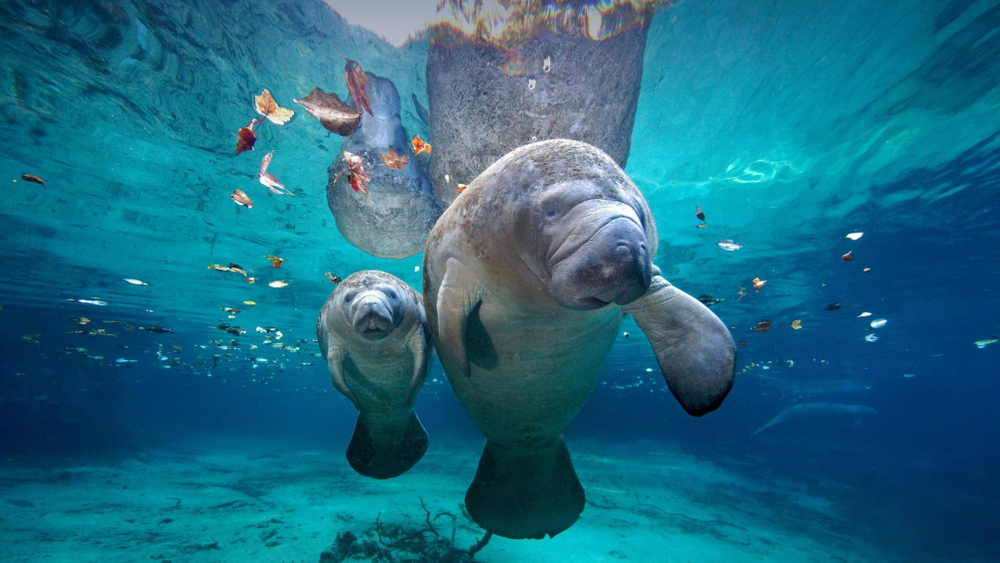
The coronavirus shutdowns, which brought major economic instability, had a razor-thin silver lining in the form of record low pollution and spectacular nature stories making a comeback. However, not all eco-friendly measures have gone well as the pandemic has continued to change day-to-day life across the country — especially for one of the ocean’s most popular gentle giants.
Conservationists report that manatees have seen a sharp increase in death rates due to the restrictions set by COVID-19 and that initiatives to protect the animal from extinction face major obstacles due to the virus.
- Manatees are generally referred to as “sea cows” because of their physical appearance and because they enjoy eating seagrass.
- One of the biggest threats to their current numbers is the loss of habitat.
- Manatees were already on the list of endangered species, in 1967.
Manatees are also known as “sea cows” because of their physical characteristics and the affinity for the seagrass. Not many people, however, know that manatees are also related to elephants. They did not evolve from elephants, but they share similar ancestry since they are both part of a group of mammals called tethytheria. Yes, they ‘re both grayish and wrinkled skin, so it might not come as a shock. Even though they are fairly large creatures, weighing almost 1,200 pounds, their behavior is remarkably graceful.
There are three major manatee species known to man. Those are West Indian manatee, West African manatee, and Amazonian manatee, which is also the smallest of the three species. All three of these animals are under danger of extinction. The West Indian Manatee, also known as the North American Manatee, is the largest living member of the Order of Sirenia.
Environmental scientists in Florida believe that the rise in illegal boating activity has contributed to a 20% rise in manatee deaths between April and May compared to last year, with June already approaching the five-year average for th is period. Shutdowns have also contributed to delays in reforming public policies and the introduction of conservation programs to protect marine animals.
The loss of habitat is one of the main threats to their survival. Manatees cannot rely on blubber to keep warm during the winter like other marine mammals. When the temperature drops, manatees need to get warm, or they could die. Due to the reduction in the number of natural springs, manatees have lost one of their key warming spots.
They also learned to rely on artificially generated hot water generated by power plants, but this is risky because there is always the possibility of such places being shut down. Such an adverse development could probably destroy a lot of the manatee population because they would be trapped in water that is too cold for them to survive.
“There are several troubling factors coming together during the pandemic,” Patrick Rose, an aquatic biologist and executive director of the nonprofit Save the Manatee Club told the Guardian. “Manatees were already facing accelerated habitat loss, rising fatalities from boat collisions, and less regulatory protection. With [COVID-19], we’re seeing manatees at an increased risk, both from policies that undermine environmental standards and from irresponsible outdoor activity, such as boaters ignoring slow-speed zones.”
Many locals site the closure of public beaches and other outdoor activities as the reason behind the spike in boating activity. “Once Florida started to open up outdoor recreation in early May, people swarmed to the waterways,” Mike Engiles, manager of Crystal River Watersports told the Guardian. “Unguided boaters and swimmers have had a detrimental effect on the environment.
There’s an increase in trash. There are reports of destruction to the grass beds from props and anchors.”
This was coupled with official guided tours of protected areas being interrupted, causing unsupervised visitors to kill local habitats and less trained eyes to spot potentially injured manatees.
Unfortunately, much of the continued danger to gentle giants lies not in the impact of the virus on regulations, but in the very human actions that eventually endanger their safety and habitat. Humans also had a detrimental effect on their primary food source-seagrass. Developing coastlines threatens their habitat, and pollution will damage the quality of the water, resulting in a very hungry manatee with nothing to eat. They are also in danger of collision with fast-moving watercraft because they are slow swimmers and cannot dive deep enough to avoid them.
Conservationists believe that deregulation measures threaten to reverse years of progress in the restoration of manatee habitats with over-development of waterfront properties and the reversal of climate initiatives to combat global warming. Many actually intend to protect their rights for decades to come.












































